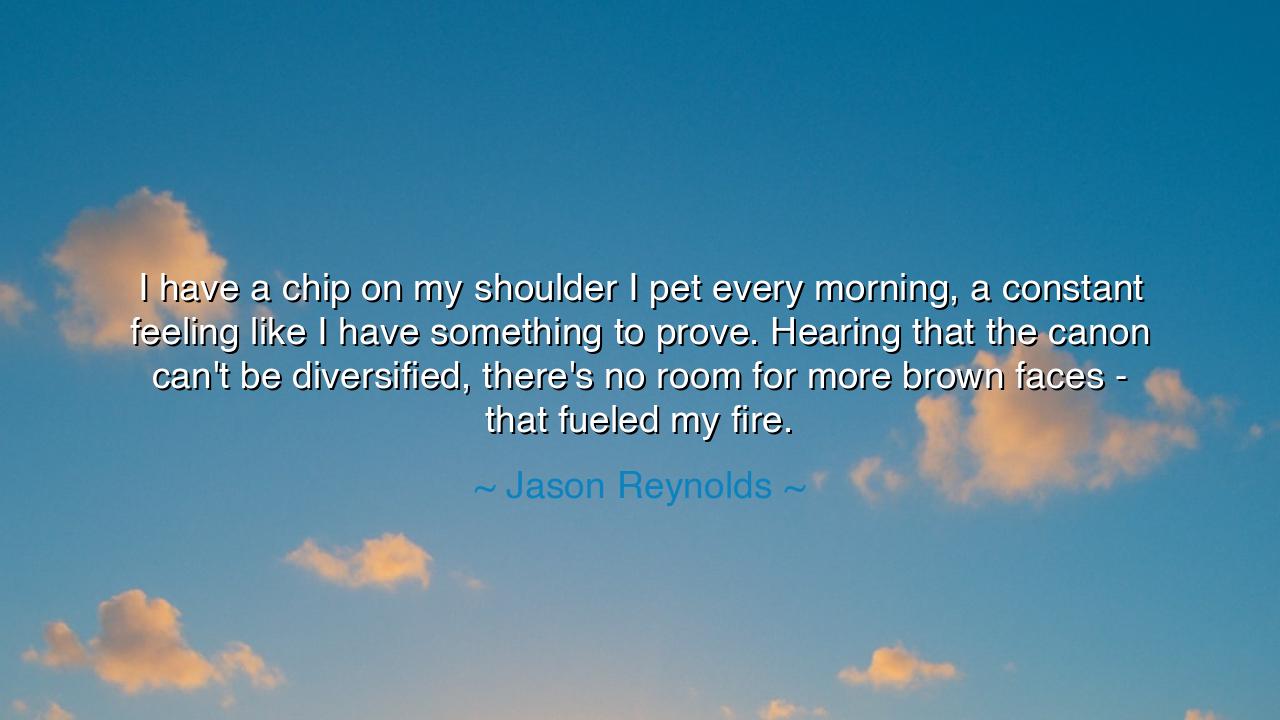
I have a chip on my shoulder I pet every morning, a constant
I have a chip on my shoulder I pet every morning, a constant feeling like I have something to prove. Hearing that the canon can't be diversified, there's no room for more brown faces - that fueled my fire.






In the hearts of the greatest warriors, there burns a fire—a fire kindled not by the applause of the crowd, but by the harsh winds of doubt and dismissal. Jason Reynolds speaks to this powerful force when he declares, "I have a chip on my shoulder I pet every morning, a constant feeling like I have something to prove. Hearing that the canon can’t be diversified, there’s no room for more brown faces—that fueled my fire." These words are not the boast of a man who seeks to conquer the world through arrogance, but the quiet, steadfast declaration of a warrior who knows that the world will often tell him there is no place for him, and yet he rises each day to prove them wrong.
The chip on the shoulder, this constant, gnawing drive to prove oneself, is as old as time itself. It has been carried by countless heroes, from Achilles, the great warrior of the Iliad, who fought with relentless fury, driven by the desire to leave his mark on the world, to Socrates, whose very existence was a testament to the notion that one must challenge the established order, regardless of the consequences. In these figures, we see the spark of Reynolds’ own words—the unyielding desire to push against the tide, to prove that one’s worth is not defined by the limitations others impose. The canon, whether in art, in literature, or in life, is often viewed as a sacred, unchangeable thing, but it is precisely this unshakable belief that drives those who are told "there is no room for you" to carve out a space where none existed before.
The phrase “chip on my shoulder” speaks to the essence of rebellion—a rebellion not against authority, but against the very idea that authority has the right to define who we are or what we can achieve. Reynolds, like many before him, embraces this rebellion, not with anger but with determination. This chip is not a burden, but a weapon—one that sharpens his resolve and fuels his fire. In the face of those who claim that the world cannot be diversified, cannot be changed, Reynolds stands as proof that the most powerful forces in history often come from those who are told they are not welcome. In his fire burns the same flame that once ignited the passions of great leaders and artists who were told their voices had no place in the world.
Consider the story of the legendary poet and philosopher, Langston Hughes, who wrote during the Harlem Renaissance. Hughes, like Reynolds, was told that his voice was unworthy of the great canon of literature—his identity as a Black man in America, his experiences, were considered unfit for the prestigious literary world. Yet Hughes did not bow to this restriction. He wrote with passion, with fire, and his words broke the barriers that sought to keep him out. Hughes' work is a testament to the power of defiance, to the notion that even when the world says “no,” the heart of the artist beats louder, carving a space where it was once denied. And in this space, a new world is born—a world where the “brown faces” that Reynolds speaks of, the stories that have been silenced, can finally rise to the surface.
Reynolds, like Hughes, represents the power of those who choose to create in the face of exclusion. When he speaks of his fire, his desire to prove something, it is a call to all those who are told their voices don’t matter, who are told that the canon, the established order, cannot change. It is the fire of all those who have been marginalized, all those who have been told they do not belong, yet refuse to be silenced. To carry a chip on one’s shoulder is to carry the weight of a world that seeks to diminish you, but it is also to carry the strength to prove them wrong, to rise above the limitations they place before you.
The lesson we must take from Reynolds' words is one of relentless perseverance in the face of doubt. When the world tells you that there is no room for you, when the canon seems closed and unyielding, it is then that you must summon your inner fire. Let the world’s dismissals be the very fuel that drives you forward. Like Reynolds, and like Hughes before him, find your voice, your story, and share it with the world. Do not let the world’s restrictions define you. The greatest movements in history—whether in art, literature, or in life—have always been born from the fire of those who were told they did not belong.
So, carry your chip, not as a burden, but as a source of power. Let it remind you every morning that the world may not always make space for you, but that does not mean you do not deserve a place. Keep your fire burning, and when the world says "no," create the world that says "yes." In this, you will find not only your voice, but the very strength to change the world around you.






AAdministratorAdministrator
Welcome, honored guests. Please leave a comment, we will respond soon